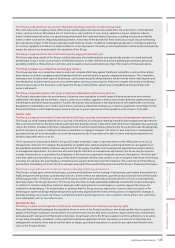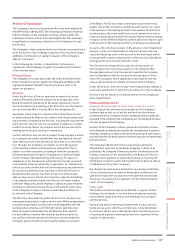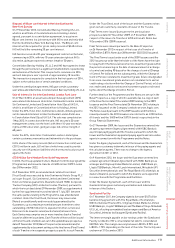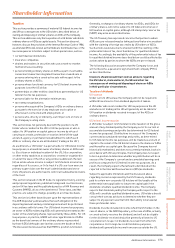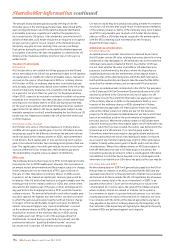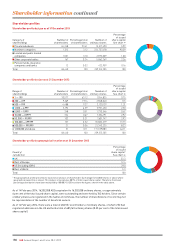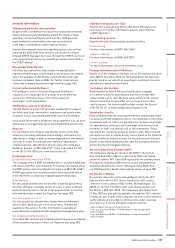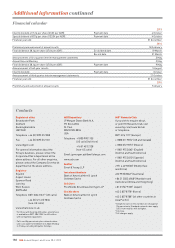Holiday Inn 2013 Annual Report Download - page 177
Download and view the complete annual report
Please find page 177 of the 2013 Holiday Inn annual report below. You can navigate through the pages in the report by either clicking on the pages listed below, or by using the keyword search tool below to find specific information within the annual report.
Following litigation on the subject, HMRC has accepted that it will
no longer seek to apply the 1.5 per cent SDRT charge when new
shares are issued to a clearance service or depositary receipt
system on the basis that the charge is not compatible with EU law.
In HMRC’s view, the 1.5 per cent SDRT or stamp duty charge will
continue to apply to transfers of shares into a clearance service or
depositary receipt system unless they are an integral part of an
issue of share capital. This view is currently being challenged in
further litigation. Accordingly, specific professional advice should
be sought before paying the 1.5 per cent SDRT or stamp duty
charge in any circumstances.
A transfer of the underlying ordinary shares will generally be
subjectto stamp duty or SDRT, normally at the rate of 0.5 per cent
of the amount of value of the consideration (rounded up to the next
multiple of £5 in the case of stamp duty). A transfer of ordinary
shares from a nominee to its beneficial owner, including the transfer
of underlying ordinary shares from the depositary to an ADS holder,
under which no beneficial interest passes, will not be subject to
stamp duty or SDRT.
US backup withholding and information reporting
Payments of dividends and other proceeds with respect to ADSs
and ordinary shares may be reported to the IRS and to the US
holder. Backup withholding may apply to these reportable
payments if the US holder fails to provide an accurate taxpayer
identification number or certification of exempt status or fails to
report all interest and dividends required to be shown on its US
federal income tax returns. Certain US holders (including, among
others, corporations) are not subject to information reporting and
backup withholding. The amount of any backup withholding from
a payment to a US holder will be allowed as a credit against the
holder’s US federal income tax liability and may entitle the holder
to a refund, provided that the required information is timely
furnished to the IRS. US holders should consult their tax advisors
as to their qualification for exemption from backup withholding
and the procedure for obtaining an exemption.
Disclosure controls and procedures
As of the end of the period covered by this report, the Group carried
out an evaluation under the supervision and with the participation
of the Group’s management, including the Chief Executive Officer
and Chief Financial Officer, of the effectiveness of the design and
operation of the Group’s disclosure controls and procedures
(as defined in Rules 13a-15(e) and 15d-15(e) of the Securities
Exchange Act 1934). These are defined as those controls and
procedures designed to ensure that information required to be
disclosed in reports filed under the Securities Exchange Act 1934
is recorded, processed, summarised and reported within the
specified periods. Based on that evaluation, the Chief Executive
Officer and Chief Financial Officer concluded that the Group’s
disclosure controls and procedures were effective.
Summary of significant corporate governance
differences from NYSE listing standards
The Group’s statement of compliance with the principles and
provisions specified in the UK Corporate Governance Code issued
by the Financial Reporting Council in the UK (Code) is set out on
page 56.
IHG has also adopted the corporate governance requirements
of the US Sarbanes-Oxley Act and related rules and of the NYSE,
to the extent that they are applicable to it as a foreign private
issuer. As a foreign private issuer, IHG is required to disclose any
significant ways in which its corporate governance practices differ
from those followed by US companies. These are as follows:
Basis of regulation
The Code contains a series of principles and provisions. It is not,
however, mandatory for companies to follow these principles.
Instead, companies must disclose how they have applied them
and disclose, if applicable, any areas of non-compliance along with
an explanation for the non-compliance. In contrast, US companies
listed on the NYSE are required to adopt and disclose corporate
governance guidelines adopted by the NYSE.
Independent Directors
The Code’s principles recommend that at least half the Board,
excluding the Chairman, should consist of independent
Non-Executive Directors. As at 17 February 2014, the Board
consisted of the Chairman, independent at the time of his
appointment, four Executive Directors and eight independent
Non-Executive Directors. NYSE listing rules applicable to
US companies state that companies must have a majority of
independent directors. The NYSE set out five bright line tests
fordirector independence. The Board’s judgment is that all of
its Non-Executive Directors are independent. However, it did
not explicitly take into consideration the NYSE’s tests in reaching
thisdetermination.
Chairman and Chief Executive Officer
The Code recommends that the Chairman and Chief Executive
Officer should not be the same individual to ensure that there is
a clear division of responsibility for the running of the Company’s
business. There is no corresponding requirement for US
companies. The roles of Chairman and Chief Executive Officer
were, as at 17 February 2014 and throughout 2013, fulfilled by
separate individuals.
Committees
The Company has a number of Board Committees which are
similar in purpose and constitution to those required for domestic
companies under NYSE rules. The NYSE requires US companies
to have both remuneration and nominating/corporate governance
committees composed entirely of independent directors,
as defined under the NYSE rules. The Company’s Nomination
Committee consists only of Non-Executive Directors and the
Company’s Audit and Remuneration Committee consists entirely of
Non-Executive Directors who are independent under the standards
of the Code, which may not necessarily be the same as the NYSE
independence standards. The nominating/ governance committee
is responsible for identifying individuals qualified to become Board
members and to recommend to the Board a set of corporate
governance principles. As the Company is subject to the Code,
the Company’s Nomination Committee is only responsible for
nominating, for approval of the Board, candidates for appointment
to the Board, though it also assists in developing the role of
the Senior Independent Director. The Company’s Nomination
Committee consists of the Chairman of the Company and all
the independent Non-Executive Directors.
The Chairman of the Company is not a member of either of the
Remuneration or the Audit Committees. Asset out on page 66,
the Audit Committee is chaired by an independent Non-Executive
Director who, in the Board’s view, hasthe experience and
qualifications to satisfy the criteria under USrules for an
“audit committee financialexpert”.
Additional Information 175
OVERVIEW STRATEGIC REPORT GOVERNANCE
GROUP
FINANCIAL STATEMENTS
PARENT COMPANY
FINANCIAL STATEMENTS ADDITIONAL INFORMATION


